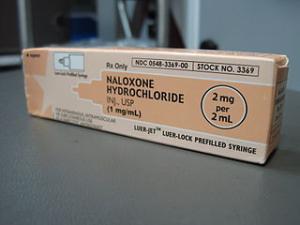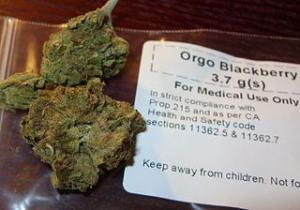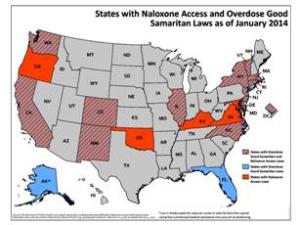The death of Phillip Seymour Hoffman has focused a media spotlight on heroin overdoses. There are better ways to deal with heroin than the current one, if there is the will.
In a critical ruling, the Michigan Supreme Court has blocked localities from banning medical marijuana-related activities that are allowed under the state's Medical Marihuana Act.
Lots of action at the state house on medical marijuana this week, plus Arizona eases up on the rules and the Michigan Supreme Court hands down a bellwether decision in favor of patients.
In a highly unusual move, and one that should be a heads-up call for aggressive law enforcement, a Texas grand jury has declined to indict a man for murder who killed a sheriff's deputy during a pre-dawn, no-knock drug raid.
A felonious foursome of public servants made the hall of shame this week.
A slight majority in Rhode Island say legalize it, CBD medical marijuana bills are popping up in several states, Uruguay's marijuana-legalizing president gets a Nobel Peace Prize nomination, and more.
Marijuana and medical marijuana dominate the drug policy news again today, the Maryland Senate votes to ban Everclear, meth and prescription pills continue to draw legislative attention, and Schapelle Corby will soon be freed from an Indonesian jail, and more.
State legislatures are busy with drug policy issues, particularly marijuana and medical marijuana, a Texas grand jury refuses to indict a man who killed a cop in a no-knock drug raid, Mexican vigilantes are duking it out with the Knights Templar in Michoacan, and more.
California's narcs are whining about Obama's marijuana remarks, Coloradans seem happy with legalization, a Good Samaritan overdose bill is filed in Maryland, an Israeli newspaper talks pot policy, and a Colombian FARC representative lays out the guerrilla's drug proposals, and more.
Overdose prevention is big news today as the drug czar chimes in in favor, more than a dozen congressmen call on Obama to re- or de-schedule marijuana, the Italian Supreme Court undoes a bad drug law, and more.
The news last Sunday that acclaimed actor Phillip Seymour Hoffman had died of an apparent heroin overdose has turned a glaring media spotlight on the phenomenon, but heroin overdose deaths had been on the rise for several years before his premature demise. And while there has been much wailing and gnashing of teeth -- and quick arrests of low-level dealers and users -- too little has been said, either before or after his passing, about what could have been done to save him and what could be done to save others.

cooking heroin (wikimedia.org)
There are proven measures that can be taken to reduce overdose deaths -- and to enable heroin addicts to live safe and normal lives, whether they cease using heroin or not. All of the above face social and political obstacles and have only been implemented unevenly, if at all. If there is any good to come of
Hoffmann's death it will be to the degree that it inspires broader discussion of what can be done to prevent the same thing happening to others in a similar position.
Hoffman, devoted family man and great actor that he was, died a criminal. And perhaps he died because his use of heroin was criminalized. Criminalized heroin -- heroin under drug prohibition -- is of uncertain provenance, of unknown strength and purity, adulterated with unknown substances. While we don't know what was in the heroin that Hoffman injected, we do know that he maintained his addiction and went to meet his maker with black market dope. That's what was found beside his lifeless body.
In a commentary published by The Guardian, actor Russell Brand, a recovered heroin addict, laid the blame for Hoffman's demise on the drug laws. "Addiction is a mental illness around which there is a great deal of confusion, which is hugely exacerbated by the laws that criminalise drug addicts," Brand wrote, calling prohibitionists' methods "so gallingly ineffective that it is difficult not to deduce that they are deliberately creating the worst imaginable circumstances to maximise the harm caused by substance misuse." As a result, "drug users, their families and society at large are all exposed to the worst conceivable version of this regrettably unavoidable problem."
We didn't always treat our addicts this way. Even after the passage of the Harrison Act in 1914, doctors continued for years to prescribe maintenance doses of opiates to addicts -- and hundreds of them went to jail for it as the medical profession fought, and ultimately lost, a battle with the nascent drug prohibition bureaucracy over whether giving addicts their medicine was part of the legitimate practice of medicine.
The idea of treating heroin addicts as patients instead of criminals was largely vanquished in the United States, but it never went away -- it lingers with methadone substitution, for example. But other countries have for decades been experimenting with providing maintenance doses of opioids to addicts, and to good result. It goes by various names -- opiate substitution therapy, heroin-assisted theatment, heroin maintenance -- and studies from Britain and other European countries, such as Germany, the Netherlands, and Switzerland, as well as the North American Opiate Medications Initiative (NAOMI) and the follow-up Study to Assess Long-Term Opiate Maintenance in Canada have touted its successes.
Those studies have found that providing pharmaceutical grade heroin to addicts in a clinical setting works. It reduces the likelihood of death or disease among clients, as well as allowing them to bring some stability and predictability to sometimes chaotic lives made even more chaotic by the demands of addiction under prohibition. Such treatment has also been found to have beneficial effects for society, with lowered criminality among participants and increased likelihood of their integration as productive members of society.
The dry, scientific language of the studies obscures the human realities around heroin addiction and opioid maintenance therapy. One NAOMI participant helps put a human face on it.
"I want to tell you what being a participant in this study did for me," one participant told researchers. "Initially it meant 'free heroin.' But over time it became more, much more. NAOMI took much of the stress out of my life and allowed me to think more clearly about my life and future. It exposed me to new ideas, people (staff and clients) that in my street life (read: stressful existence) there was no time for."
"After NAOMI, I was offered oral methadone, which I refused. After going quickly downhill, I ended up hopeless and homeless. I went into detox in April 2007, abstained from using for two months, then relapsed. In July 2008 I again went to detox and I am presently in a treatment center... I am definitely not "out of the woods" yet, but I feel I am on the right path. And this path started for me at the corner of Abbott and Hastings in Vancouver... Thank you and all who were involved in making NAOMI happen. Without NAOMI, I wouldn't be where I am today. I am sure I would be in a much worse place."
Arnold Trebach, one of the fathers of the drug reform in late 20th Century America, has been studying heroin since 1972, and is still at it. He examined the British system in the early 1970s, when doctors still prescribed heroin to thousands of addicts, and authored a book, The Heroin Solution, that compared and contrasted the US and UK approaches. Later this month, the octogenarian law professor will be appearing on a panel at the Vermont Law School to address what Gov. Peter Shumlin (D) has described as the heroin crisis there.

Phillip Seymour Hoffman (wikimedia.org)
"The death of Phillip Seymour Hoffman is a tragedy all the way around,"
Trebach told the Chronicle. "It's a bad idea to use heroin off the street, and he shouldn't have been doing that."
That said, Trebach continued, it didn't have to be that way.
"If we had had a sensible system of dealing with this, he would have been in treatment under medical care," he said. "If he was going to inject heroin, he should have been using pharmaceutically pure heroin in a medical setting where he could also have been exposed to efforts to straighten out his personal life, and he could have access to vitamins, weight control advice, and the whole spectrum of medical care. And if he had had access to opioid antagonists, he could still be alive," he added.
While Hoffman may have made bad personal choices, Trebach said, we as a society have made policy choices seemingly designed to amplify the prospects for disaster.
"This is a sad thing. He is just another one of the many victims of our barbaric drug policy," he said. "This was a totally unnecessary death at every level. He shouldn't have been using, but we should have been taking care of him."
The stuff ought to be legalized, Trebach said.
"I'm an advocate of full legalization, but if we can't go that far, we need to at least provide social and psychological support for these people," he said. "And even if we were to decriminalize or legalize, I would still want to figure out ways to provide support and love and kindness to people using the stuff. I advise you not to do it, but if you're going to use it, I want to keep you alive. I remember talking to people from Liverpool [a famous heroin maintenance clinic covered in the '90s by Sixty Minutes, linked above] about harm reduction around heroin use back in the 1970s. One of the ladies said it is very hard to rehabilitate a dead addict."
"There are plenty of things we can be doing," said Hilary McQuie, Western director for the Harm Reduction Network, reeling off a list of harm reduction interventions that are by now well-known but inadequately implemented.
"We can make naloxone (Narcan) more available. We need better access to it. It should be offered to people like Hoffman when they are leaving treatment programs, especially if they've been using opiates, just as a safeguard," she said. "Having treatment programs as well as harm reduction programs distribute it is important. We can cut the overdose rate in half with naloxone, but there will still be people using alone and people using multiple substances."
There are other proven interventions that could be ramped up as well, McQuie said.
"Safe injection sites would be very helpful, so would more Good Samaritan overdose emergency laws, and more education, not to mention more access to methadone and buprenorphine and other opioid substitution therapies (OST)," she said, reeling off possible interventions.
Dr. Martin Schechter, director of the School of Population and Public Health at the University of British Columbia in Vancouver, knows a thing or two about OST. The principal study investigator for the NAOMI and the follow-up SALOME study, Schechter has overseen research into the effectiveness of treating intractable addicts with pharmaceutical heroin, as well as methadone. The results have been promising.
"What we're using is medically prescribed pharmaceutical diacetylmorphine, the active ingredient in heroin," he explained. "It's what you have when you strip away all the street additives. This is a stable, sterile medication from a pharmaceutical manufacturer. We know the precise dose tailored for each person. With street heroin, not only is it adulterated and injected in unsterile situations, but people really don't know how strong it is. That's probably what happened to Mr. Hoffman."

Naloxone (Narcan) can reverse opiate overdoses (wikimedia.org)
"Never did we have a fatal overdose," Schechter said. "Because it was in a clinic, nurses and doctors are right there. We administer Narcan (naloxone), and they wake up."
Heroin maintenance had even proven more effective than methadone in numerous studies, Schechter said.
"There have been seven randomized control trials across Europe and in Canada that have shown for people who have already tried treatments like methadone, that medically prescribed heroin is more effective and cost effective treatment than simply trying methadone one more time."
Those studies carry a lesson, he said.
"We have to start looking at heroin from a medicinal point of view and treat it like a medicine," he argued. "The more we drive its use underground, the more overdoses we get. We need to expand treatment programs, not only with methadone, but with medically prescribed heroin for people who don't respond to other treatments."
Safe injection sites are also a worthwhile intervention, Schechter said, although he also noted their limitations.
"Injecting under supervision is much safer; if there is an overdose, there is prompt attention, and they provide sterile equipment, reducing the risk of HIV and Hep C," he said. "But they are still injecting street heroin."
He would favor decriminalizing heroin possession, too, he said.
Harm reduction measures, opioid maintenance treatments, and the like are absolutely necessary interventions, said McQuie, but there is a larger issue at hand, as well.
"We still need to look at the overall issue of the stigmatization of drug users," she said. "People aren't open about their use, and that puts them in a more dangerous situation. It's really hard in a criminalized environment."
Stigmatization means to mark or brand someone or something as disgraceful and subject to strong disapproval. Defining an activity, such as heroin possession, as a crime is stigmatization crystallized into the legal structures of society itself.
"The ultimate harm reduction solution," McQuie argued, "is a regulated, decriminalized environment where it is available by prescription, so people know what they're getting, they know how much to use, and it's not cut with fentanyl or other deadly adulterants. People wouldn't have to deal with all the collateral damage that comes from being defined as criminals as well as dealing with the consequences of their drug use. They could deal with their addictions without having to worry about losing their homes, their families, and their freedoms."
While such approaches have a long way to go before winning wide popular acceptance, policymakers should at least be held to account for the consequences of their decision-making, McQuie said, suggesting that the turn to heroin in recent years was a foreseeable result of the crackdown on prescription opioid pain medication beginning in the middle of the last decade.
"They started shutting down all those 'pill mills' and people should have anticipated what would happen and been ready for it," she said. "What we have seen is more and more people turning to injecting heroin, but nobody stopped to do an impact statement on what would be the likely result of restricting access to pain pills."
The impact can be seen in the numbers on heroin use, addiction, and overdoses. While talk of a "heroin epidemic" is overblown rhetoric, the number of heroin users has increased dramatically in the past decade. According to the Substance Abuse and Mental Health Services Administration (SAMHSA), the number of past year users grew by about 50% between 2002 and 2011, from roughly 400,000 to more than 600,000. At the same time, the number of addicted users increased from just under 200,000 to about 370,000, a slightly lesser increase.
If there is any good news, it is that, according to the latest (2012) National Household Survey of Drug Use and Health, the number of new heroin users has remained fairly steady at around 150,000 each year for the past decade. That suggests, however, that more first-time users are graduating to occasional and sometimes, dependent user status.
And some of them are dying of heroin overdoses, although not near the number dying from overdoses from prescription opioids. Between 1999 and 2007, heroin deaths hovered just under 2,000, even as prescription drug deaths skyrocketed, from around 2,500 in 1999 to more than 12,000 just eight years later. But, according to the Centers for Disease Control, by 2010, the latest year for which data are available, heroin overdose deaths had surpassed 3,000, a 50% increase in just three years.
While the number of heroin overdose deaths is still but a fraction of those attributed to prescription opioid overdoses and the numbers since 2010 are spotty, the increase that showed up in 2010 shows no signs of having gone away. Phillip Seymour Hoffman may be the most prominent recent victim, but in the week since his death, another 50 or 60 people have probably followed him to the morgue due to heroin overdoses.
There are ways to reduce the heroin overdose death toll. It's not a making of figuring out what they are. It's a matter of finding the political and social will to implement them, and that requires leaving the drug war paradigm behind.
back to top
In a bellwether case, the Michigan Supreme Court has ruled that cities and counties cannot pass ordinances that conflict with the state's five-year-old Medical Marihuana Act. The ruling came in Ter Beek v. the City of Wyoming.
In that case, registered patient James
Ter Beek sued the city of Wyoming after it passed a 2010 ordinance designed to block the use of medical marijuana in the city by prohibiting any use, cultivation, or manufacture of the plant.
"The fact is medical marijuana helps people; it's helped me," said Ter Beek, a retired attorney who suffers from diabetes and a neurological disorder that causes neuropathy and severe pain. "I've tried narcotic-based drugs like Vicodin and OxyContin and nothing worked like medical marijuana. I have more freedom than ever before and I couldn't just sit by as our elected officials try to take that away from me and thousands of others."
Ter Beek, represented by the ACLU of Michigan, argued that the ordinance made him fear arrest and prosecution for activities explicitly protected by the medical marijuana law, and that the state law should preempt the local ordinance. The city, on the other hand, argued that its ordinance sought to uphold federal as well as state law, and that the federal Controlled Substances Act preempted the state law.
Ter Beek lost in district court, but won on appeal. Now, the state's highest court has upheld that decision.
Wyoming's ordinance "directly conflicts" with the state's medical marijuana because it allows what the law "expressly prohibits: the imposition of any penalty, including a civil one, on a registered qualifying patient whose medical use of marijuana falls with... the immunity" granted under state law, Justice Bridget McCormack wrote for a unanimous court.
Federal laws prohibiting marijuana do not preempt the state Medical Marihuana Act because it "doesn't interfere with or undermine federal enforcement of that prohibition," McCormack wrote. That doesn't mean people protected under the state law are immune from federal arrest or prosecution, the court was quick to note.
The Supreme Court decision also invalidates similar ordinances in other Michigan cities that attempted to use them to block medical marijuana activities, including Birmingham, Bloomfield Hills, and Livonia. The ACLU of Michigan had challenged ordinances in all three of those cities as well.
back to top
Lots of action at the state house on medical marijuana this week, plus Arizona eases up on the rules and the Michigan Supreme Court hands down a bellwether decision in favor of patients. Let's get to it:
ArizonaOn Monday, state officials proposed easing medical marijuana program rules, including a change that would allow additional permit holders to grow their own. Click here to check out the proposed draft rules.
California
On Tuesday, Butte County supervisors adopted strict new cultivation rules. By a unanimous vote, supervisors approving measures that would limit grows to 50 square feet on lots up to five acres and 100 square feet on lots between five and 10 acres. Opponents of the new rules have already begun the process of petitioning to get them changes.
On Wednesday, Santa Monica will consider allowing delivery services. The planning commission is set to consider a new recommendation by staff to ban dispensaries and replace this with delivery services. The city has never allowed dispensaries, but supporters had hoped to see a proposal to allow one or two. Instead, they got this.
Florida
Last Thursday, a new poll had 57% support for the state's medical marijuana initiative. The Gravis Marketing poll had only 31% opposed. But when Gravis asked respondents to consider that marijuana remained illegal under federal law, opposition rose to 54%.
Also last Thursday, a CBD medical marijuana bill was filed. Rep. Matt Gaetz (R-Shalimar) filed a bill to allow for low-THC, high-CBD strains of marijuana to be used for medical purposes. The bill is House Bill 843.
Georgia
On Monday, a CBD medical marijuana bill got a hearing in the House. After a three-hour committee hearing Monday, state Rep. Allen Peake (R-Macon), the sponsor of the bill, House Bill 885, said it needed significant revisions before it could advance in the House. The hearing included searing testimony from parents of children suffering seizures, but also from physicians who said the use of CBD cannabis oils needed more study. Another hearing is set for Thursday.
Kentucky
Last Wednesday, a CBD medical marijuana bill was filed. State Sen. Julie Denton filed Senate Bill 124, which would allow the limited use of CBD cannabis oil to treat children with seizures.
On Sunday, the Bluegrass poll had support for medical marijuana at 52%.
Maine
Last Thursday, a medical marijuana bill got a hearing. Legislative Document 1674 would expand prohibitions on the use of pesticides in cultivation to include patients growing for themselves.
On Tuesday, another medical marijuana bill got a hearing. Legislative Document 1597 would give government officials access to any medical marijuana grow. The industry group Medical Marijuana Caregivers of Maine thinks the latter bill is too broad.
Massachusetts
On Tuesday, the Haverhill city council extended a moratorium on dispensaries amid concerns about "misrepresentations" by Healthy Pharms, Inc., which is seeking to open a facility there. The council extended the moratorium to November 18.
Michigan
Last Thursday, the state Supreme Court blocked localities from passing ordinances that violate the state's Medical Marihuana Act. The ruling in Ter Beek v. the City of Wyoming means that cities cannot bar patients from growing their own marijuana.
Nevada
Last Wednesday, the Las Vegas city council directed staff to research plans to allow dispensaries. The move came on a 5-2 vote. The council enacted a six-month dispensary ban last fall and can come back later and vote to allow dispensaries.
Oregon
Last Thursday, the Phoenix city council dropped a motion to pass an emergency dispensary moratorium. Council members said the proposal was "ridiculous" and unnecessary.
On Tuesday, a bill to allow cities to ban dispensaries was amended in the Senate Judiciary Committee. Senate Bill 1531 now only allows cities to regulate them, not ban them.
Washington
Last Friday, bills that would tighten rules on patients advanced in the Senate. Senate Bill 5887 and Senate Bill 6178 each passed 6-1 in the Senate Committee on Commerce and Labor. They would end collective gardens for patients as part of the state's embrace of marijuana legalization.
On Monday, a bill that would reduce the amount of marijuana patients could have advanced in the House. House Bill 2149 passed out of the House Appropriations Committee.
[For extensive information about the medical marijuana debate, presented in a neutral format, visit MedicalMarijuana.ProCon.org.]
back to top
It happens on a regular basis. Police conducting no-knock drug raids shoot and kill residents, claim they feared for their lives, and walk away free. But now, the shoe is on the other foot.
A Central Texas grand jury has
refused to return a murder indictment against a Burleson County man who
shot and killed sheriff's Sgt. Adam Sowders as
Sowders led a group of law enforcement raiders through the door of the man's mobile home in a no-knock, pre-dawn drug raid on December 19.
The raiders had a search warrant for the home of Henry Goedrich Magee and were looking for marijuana plants and guns. But when they burst through the door, Magee, who was sleeping with his girlfriend, feared a home invasion robbery, grabbed a gun from his bed side, and opened fire, killing Sowders.
"This was a terrible tragedy that a deputy sheriff was killed, but Hank Magee believed that he and his pregnant girlfriend were being robbed," Magee's lawyer, renowned Texas criminal defense attorney Dick DeGuerin told the Associated Press. "He did what a lot of people would have done. He defended himself and his girlfriend and his home."
DeGuerin added that he could not recall another instance of a Texas grand jury declining to indict a defendant in the death of an officer.
The grand jury did indict Magee for the possession of a small number of marijuana plants and for having a gun while growing the pot plants. That charge is possession of marijuana while in possession of a deadly weapon, a third-degree felony. Conviction on a third-degree felony charge is punishable by from two to 10 years in state prison.
Burleson County District Attorney Julie Renken said after the grand jury decision that she thought the shooting had "occurred in a matter of seconds amongst chaos" and she thought the sheriff's office had done things correctly, "There is not enough evidence that Mr. Magee knew that day that peace officers were entering his home," she conceded.
Renken vowed to "fully prosecute" the remaining case against Magee, who has been jailed without bond in nearby Washington County. DeGeurin said Magee will likely be released soon, since he faces only the marijuana and gun charge.
This was all over some pot plants.
back to top
A felonious foursome of public servants made the hall of shame this week. Let's get to it:

pile-of-cash_149.jpg
In Savannah, Georgia,
a Savannah-Chatham police sergeant was arrested Sunday for lying to the Chatham-Savannah Counter Narcotics Team during a 2010 investigation into corruption around drug trafficking.
Sgt.
Malik Abdul
Khaalis had already been indicted for false statements in January, but has now been hit with two felony counts of violation of oath by a public officer and seven felony counts of false statements and writings.
In Buffalo, New York, a former Buffalo police officer pleaded guilty last Thursday to selling marijuana. James Hamilton Sr., 29, sold a half pound of marijuana to a snitch working for federal investigators. After the arrest, authorities seized 80 marijuana plants and more than three pounds of marijuana from his Buffalo home. He faces up to five years in prison when he's sentenced June 18.
In Baltimore, a former Baltimore police officer was sentenced last Thursday to five years in federal prison for agreeing to run a tax scam with someone she thought was a heroin dealer. Ashley Roane, 26, agreed to steal personal information from police databases so a tax preparer could file false returns. The tax preparer was an FBI snitch who also proposed a drug deal to Roane, who agreed to check whether a source for heroin was an informant and to provide protection when the deal went down. She made $6,000 for her efforts. She pleaded guilty to extortion and identity theft.
In Norfolk, Virginia, a former Virginia Beach probation officer was sentenced last Friday to 6 ½ years in federal prison for selling methamphetamine with her husband. Katherine Kephart, 31, admitted trafficking meth between Virginia and North Carolina, as well as using her position to check names and license plate numbers of prospective partners to see if they were under court supervision or working as informants. She copped to one count of conspiracy to possess and distribute more than five grams of the drugs. So did her husband, who got the same sentence.
back to top
A slight majority in Rhode Island say legalize it, CBD medical marijuana bills are popping up in several states, Uruguay's marijuana-legalizing president gets a Nobel Peace Prize nomination, and more. Let's get to it:

Uruguayan President Jose Mujica has been nominated for the Nobel Peace Prize (gob.uy)
Oregon Bill to Study Legalization Advances. A bill that would direct the state Department of Justice to examine laws to see what changes would need to be made in the event of marijuana legalization passed the House Judiciary Committee Wednesday. That bill is House Bill 4099, which now moves to the Budget Committee. This is not the bill that would have the legislature put an initiative on the November ballot. That bill is Senate Bill 1556.
Slight Majority Supports Legalization in Rhode Island Poll. A Public Policy Polling survey commissioned by the Marijuana Policy Project has support for legalization at 53%. The poll also found that 38% thought marijuana was safer than alcohol, compared to 21% vice versa. Another 21% thought the two were equally dangerous, while 20% said they didn't know. Click on the title link for the poll results.
Medical Marijuana
Alabama CBD Bill Wins Committee Approval. The Senate Judiciary Committee Wednesday approved a bill that would allow for the use of cannabidiol (CBD) for certain medical conditions, including seizures, severe or chronic pain, or "any other condition that is severe and resistant to conventional medicine." The bill is Senate Bill 174, which now goes to the full Senate.
CBD Bill Filed in Kentucky. State Sen. Julie Denton (R-Louisville) and eight cosponsors Wednesday filed Senate Bill 124, which would allow the use of CBD cannabis oils for children with epilepsy.
Public Hearing Next Tuesday on Oregon Local Control Dispensary Bill. There will be a public hearing in the Senate Judiciary Committee next Tuesday on Senate Bill 1531, which would allow local government to regulate or ban dispensaries. The bill is supported by associations of state city and county governments, but opposed by medical marijuana supporters. The legislature voted last year to approve a system of statewide dispensary regulations, which will begin to take effect March 1.
Americans for Safe Access Seeks Petition Signatures to Boost Effort on Organ Transplants for California Medical Marijuana Patients. Americans for Safe Access is seeking to show support for possible legislation protecting California medical marijuana patients who may need organ transplants. Hospitals and doctors have been reluctant to okay transplants for medical marijuana patients, whom they deem drug abusers. Click on the title link to get to the petition.
Rhode Island Attorney General Chides Dispensary on Advertising. In a Wednesday press release, Rhode Island Attorney General Peter Kilmartin chided the Thomas C. Slater Compassion Center for recent email advertising campaigns offering discounts and special holiday packages. "Can you imagine the public outcry if the local pharmacy started offering [half] off Oxycontin or medicinal drugs?'' Kilmartin said. "Compassion centers should be held to the same standard and should be prohibited from offering discounts or sales on medicinal marijuana.'' The dispensary said it would stop advertising its products.
International
Uruguay's Marijuana-Legalizing President Mujica Nominated for Nobel Peace Prize. Uruguayan President Jose "Pepe" Mujica has been nominated for the Nobel Peace Prize. He was nominated by members of his own Frente Amplio political party, as well as a Dutch NGO, the Drugs Peace Institute. His supporters cited his pioneering policy of legalizing and regulating marijuana commerce.
Peru Says Still Committed to Eradicating 75,000 Acres of Coca in the VRAEM. Carmen Masias, head of the Peruvian anti-drug agency DEVIDA, said Tuesday the Peruvian government remains committed to eradicating 75,000 acres of coca crops in the Valleys of the Apurimac, Ene, and Mantaro Rivers (VRAEM). The area accounts for more than half of all Peruvian coca production. [Ed: Historically coca eradication has merely shifted growing from one area to another -- causing deforestation in the process. A recent report highlighted the impact drug trafficking (not growing, but a similar idea) has on forests, and the author suggested reforming drug policies.]
Australia's Victoria Plans Construction Site Drug Testing; Union Strongly Objects. Victoria Premier Dennis Napthine said Thursday he would require construction companies to implement strict alcohol and drug testing policies to qualify for government contracts. The main construction union, the Victorian Construction, Forestry, Mining, and Energy Union (CSMEU) condemned the move as a "slur" on construction workers, saying there was no evidence that people in the industry had any more drug problems than anybody else.
Iranian Meth Offender Survives Execution, Gets Sentence Reduced to Life. An Iranian man who was revived in the morgue after being hung for possessing a kilo of meth has been granted a reprieve by the Iranian amnesty commission. The man, identified only as Alireza M., 37, instead will now be sentenced only to life in prison. The man's revival after execution raised thorny questions for Iranian jurists and clerics about whether he should be re-executed or not.
back to top
Marijuana and medical marijuana dominate the drug policy news again today, the Maryland Senate votes to ban Everclear, meth and prescription pills continue to draw legislative attention, and Schapelle Corby will soon be freed from an Indonesian jail, and more. Let's get to it:

Schapelle Corby will soon walk out of an Indonesian jail.
New Mexico Senate Committee Considers Legalization Bill Today. The Senate Rules Committee was expected to consider a marijuana legalization bill today. The bill is Senate Joint Resolution 10, sponsored by Sen. Gerald Ortiz y Pino (D-Albuquerque). It would create a constitutional amendment legalizing marijuana, which, if approved by the legislature, would then have to be approved by voters in a referendum.
Arizona Legalization Bill Introduced.Sen. Ruben Gallego (D-Phoenix) has introduced House Bill 2558, which would allow adults to use, possess, and cultivate small amounts of marijuana, and set up a system to tax and regulate marijuana commerce.
Oregon Bill Would Allow Gun License Despite Marijuana Conviction. Oregon law currently allow people with marijuana possession convictions to obtain a concealed hand gun permit, but a new bill, House Bill 4068 would expand that protection to include people busted in other states, and perhaps, people busted before 1973. The bill got a hearing Wednesday. It is supported by the Oregon State Sheriff's Association, which called it "an issue of fundamental fairness."
Joe Biden Reiterates Obama Administration Marijuana Policy. While the Obama administration thinks cracking down on marijuana is a waste of resources, it doesn't favor legalizing it, either, Vice President Biden told Time magazine Thursday. "I think the idea of focusing significant resources on interdicting or convicting people for smoking marijuana is a waste of our resources," Biden said. "That's different than [legalization.] Our policy for our administration is still not legalization, and that is and continues to be our policy."
Massachusetts Poll Has Slight Majority for Legalization. A new Suffolk University/Boston Herald poll has support for marijuana legalization in the Bay State at 53%, with 37% opposed and 10% undecided.
Medical Marijuana
Michigan High Court Rules for Medical Marijuana. In a bellwether case, the Michigan Supreme Court ruled Thursday that cities and counties cannot pass ordinances that conflict with the state's five-year-old Medical Marihuana Act. The ruling came in Ter Beek v. the City of Wyoming. A number of cities had attempted to ban medical marijuana activities, but the ruling says they cannot do that, although they can regulate them.
Maine Medical Marijuana Bills Get Hearings. Medical marijuana bills are getting attention in Augusta. Legislative Document 1674, which would expand prohibitions on the use of pesticides in cultivation to include patients growing for themselves, got a hearing Thursday. Legislative Document 1597, which would give government officials access to any medical marijuana grow, is set for a hearing next Thursday. The industry group Medical Marijuana Caregivers of Maine thinks the latter bill is too broad. Legislative Document 1739 would create additional regulations and is set for a hearing next Tuesday. Click on the title link for more hearing information.
Florida CBD Medical Marijuana Bill Filed. Rep. Matt Gaetz (R-Shalimar) has filed a bill to allow for low-THC, high-CBD strains of marijuana to be used for medical purposes. The bill is House Bill 843.
Georgia CBD Medical Marijuana Bill Gets Hearing Monday. A bill that would allow the use of high-CBD cannabis oil for patients suffering from certain types of seizures will get a hearing Monday. House Bill 885, sponsored by Rep. Allen Peake (R-Macon), will get a hearing at the House Health and Human Services Committee.
Hemp
President Obama Signs Farms Bill With Hemp Amendment. President Obama Friday signed into law the omnibus farm bill, which includes a hemp amendment allowing for research pilot projects in states that have approved them.
Hemp Bill Moving in Washington State. A bill that would authorize Washington State University to study the feasibility and value of a hemp industry in the state is on the move. House Bill 1888 passed out of the House Appropriations Subcommittee on General Government & Information Technology Thursday and now heads for the Ways and Means Committee. The just-passed federal farm bill includes a provision allowing for hemp research in states that have approved it.
Alcohol
Maryland Senate Passes Ban on Everclear. The Maryland Senate this approved a bill that would ban the sale of any alcohol product at or above 190 proof, or 95% ethyl alcohol. The bill is Senate Bill 75, and supporters said the ban would cut down on binge drinking and date rape, but opponents called it a "feel good" move. Similar legislation has twice previously passed the Senate, only to die in the House, but this year it has the backing of Del. Charles Barkley (D-Montgomery), chair of the Economic Matters subcommittee on alcohol, which increases its chances of getting a floor vote.
Prescription Drugs
South Carolina Bill Would Increase Penalties for Pill Trafficking, Set Them By Pill Quantity. A bill backed by Lt. Gov Glenn McConnell (R) and aimed at what he called "a criminal cancer that will affect the health of seniors" would increase penalties for prescription drug trafficking and set penalties based on the number of pills seized -- not the weight of the drugs. Possession of 600 or more prescription pills would garner a mandatory minimum 15-year prison sentence. Senate Bill 1012 would also make having multiple prescriptions for the same drug evidence of possession with intent to distribute.
Methamphetamine
Michigan Bill Would Bar Drug Felons From Buying Pseudoephedrine. A bill that would bar people with felony drug convictions from purchasing products containing pseudoephedrine, a precursor chemical for meth, got a hearing Wednesday in the House Criminal Justice Committee. House Bill 5088 was introduced by Rep. John Kivela (D-Marquette). Two related bills, House Bill 5089 and House Bill 5090 were also discussed. They address "smurfing."
Harm Reduction
Needle Exchange Reform Bill Moving in Maryland. The state Senate Thursday approved a bill to undo a restriction in existing state law that prevents injection drug users from picking up more clean needles at the Baltimore needle exchange than they turn in. The Senate approved Senate Bill 263 by an overwhelming 39-5 vote. The measure now heads to the House.
International
Schapelle Corby Wins Parole in Indonesia. Indonesian authorities announced Friday that Schapelle Corby, an Australian woman whose case made international headlines when she was convicted for smuggling nine pounds of marijuana into Bali in 2005, has been paroled. It's not clear yet when she will actually walk out of prison in Bali. She had been sentenced to 20 years in what many Australians considered a set-up.
back to top
State legislatures are busy with drug policy issues, particularly marijuana and medical marijuana, a Texas grand jury refuses to indict a man who killed a cop in a no-knock drug raid, Mexican vigilantes are duking it out with the Knights Templar in Michoacan, and more. Let's get to it:
Marijuana PolicySouthern Cannabis Reform Conference in Atlanta Next Month. Peachtree NORML is hosting a marijuana reform conference in Atlanta on March 22. Click on the title link for ticket information.
Washington Bill Would Use Marijuana Revenue to Help Fund College Tuition. A bill introduced by Sen. Mike Baumgartner (R-Spokane) to effectively cap tuition rates at state colleges and universities relies in part on expected marijuana tax revenues. The bill, House Bill 6043 is part of Baumgartner's broader plan to improve basic education and ease the tuition burden on college students.
Legalization Bill Stalls in New Mexico Senate. A bill that would let New Mexico voters decide whether to legalize marijuana is stalled -- at least for now -- in the state Senate. The Rules Committee last Friday failed to debate it, but bill sponsor Sen. Gerald Ortiz y Pino said he hoped the committee would take it up this week.
New Hampshire House Subcommittee Meeting on Legalization Bill Today. A House Ways and Means Committee subcommittee is discussing the revenue and regulatory aspects of a bill that would make marijuana legal and regulate it like alcohol in the Granite State. House Bill 492 would make personal possession and home cultivation of limited amounts of marijuana legal for adults age 21 and older. It would also direct the state to license and regulate marijuana retail, cultivation, production, and testing facilities. The subcommittee is expected to consider changes to the bill's proposed system for taxing and regulating marijuana. The bill has already passed the House once, but must do so again before heading to the Senate.
Los Angeles Mayor Suggests He Could Support Legalization. In an interview with a local TV station, LA Mayor Eric Garcetti suggested he could support an initiative that legalized marijuana. "[Legalizing marijuana] would make life easier to me in terms of the regulations... I think there's probably a majority of Californians that would like to see that, and I generally would be for that. I've never seen much of a difference between marijuana and alcohol... alcohol has rules around it," Garcetti said. "If we had something similar with marijuana it would probably be a good revenue generator." To listen, go to the 3:23 mark in the second video.
Hawaii Appeals Court Nixes Local Lowest Law Enforcement Priority Initiative. The Hawaii Intermediate Court of Appeals ruled last Friday that a voter-approved Hilo County initiative directing law enforcement to make adult personal use of marijuana on private property its lowest priority is unenforceable. The 2008 initiative won handily in Hilo, but the county council failed to implement it. Both a district court and now the appeals court have ruled that state marijuana laws preempt it. Advocates vowed to appeal to the state Supreme Court.
Oregon Bill to Refer Legalization to Voters Gets Hearing Tuesday. A bill that would put a legislature-written marijuana legalization initiative on the November ballot gets a hearing Tuesday. Senate Bill 1556 is set for a hearing before the Senate Judiciary Committee.
Medical Marijuana
Oregon Bill to Let Localities Ban Dispensaries Gets Hearing Tuesday. A bill that would allow cities and counties to ban dispensaries gets a hearing Tuesday. The bill, Senate Bill 1531, will be heard by the Senate Judiciary Committee.
Colorado Patient Wins Fight to Stay in Federal Housing. A quadriplegic medical marijuana patient who was threatened with eviction from the Longmont Housing Authority has prevailed in her struggle to remain, and she has prompted the housing agency to create a new policy. Ashley Weber is that patient.
Support for Medical Marijuana in Guam at 55%. A University of Guam poll has support for medical marijuana at 55%. The poll comes as the Guam legislature considers a bill that would ask residents to vote in a referendum to approve medical marijuana.
Support for Medical Marijuana in Kentucky at 52%. The latest Bluegrass Poll has support for medical marijuana in Kentucky at 52%, with 37% opposed. Last year, the same poll had support for "prescribed" marijuana at 60%. This year's poll dropped "prescribed," and that accounted for the difference, said pollster Jay Leve of SurveyUSA. A CBD medical marijuana bill is currently before the legislature.
Support for Medical Marijuana Amendment in Florida at 57%. A Gravis Marketing poll has support for the state's medical marijuana initiative at 57%, with 31% opposed. But support dropped dramatically when voters were reminded that the production and sale of marijuana remained illegal under federal law, with 54% opposing, 27% supporting, and 19% uncertain.
Arizona Officials Propose Easing Rules. State health officials are proposing changes for Arizona's medical marijuana program, including one that would allow additional permit holders to grow their own. Click here to check out the proposed draft rules.
Wisconsin CBD Medical Marijuana Bill Gets Hearing Wednesday. A bill that would allow for the use of CBD cannabis oil gets a hearing in the Assembly Committee on Children and Families Wednesday. The bill, Assembly Bill 726, has three Republican cosponsors, but faces other hostile Republican legislators.
Methamphetamine
South Dakota Bill to Add State to National Monitoring System Passes Senate. A bill that would add South Dakota to the National Precursor Log Exchange (NPLEx) passed the Senate last week and now heads to the House. Senate Bill 24 is supported by Attorney General Marty Jackley and other state officials. Under the bill, retailers selling pseudoephedrine (e.g. Sudafed) would electronically submit the purchaser's name, date of birth and address, along with the quantity sold at the specific time and date. [Ed: Methamphetamine manufacturing rings have gotten around pseudoephedrine purchase limits by hiring "smurfers" to buy the substance for them. It's not clear how the national database will be more effective in this regard than previous monitoring systems.]
Drug Testing
West Virginia Public Benefits Drug Testing Bill Targets Felons and Drug Offenders. Convicted felons and drug offenders would have to pass a drug test before obtaining federal or state assistance under a bill introduced in the state legislature last Thursday. House Bill 4433 would mandate that those who fail the drug tests would be ineligible to apply for assistance for two years, but that would drop to six months if they took drug treatment and passed a second drug test. The bill is before the House Judiciary Committee.
Sentencing
Missouri Criminal Code Revisions Would Cut Drug Sentences. An 1,100-page bill that revamps the state's criminal laws reduces a number of drug sentences. Marijuana possession would be reduced from up to a year in jail to no jail time for first offenders. Felony drug possession maximum sentences would drop from seven years to four. The bill has more support in the Senate than in the House, where Rep. Stanley Cox (R-Sedalia), head of the House Judiciary Committee, said he opposed using the bill to change the drug laws. The bill is Senate Bill 491.
Federal Judge Cuts Marijuana Sentences, Citing Likely Federal Sentencing Reforms. Why wait? A Tennessee federal judge last Thursday gave reduced prison sentences to three major marijuana offenders, saying he expects Congress to act to lower sentences for drug offenders. Judge Curtis Collier citing the pending approval of the Smarter Sentencing Act and recommendations from the US Sentencing Commission. The three defendants got about half the prison time they otherwise would have.
Law Enforcement
Innovative Diversion Program Underway in Santa Fe, New Mexico. The Santa Fe city council has approved adoption of the Law Enforcement Assisted Diversion (LEAD) program pioneered in Seattle. Instead of sending minor offenders back into the criminal justice system, LEAD offers them a chance to obtain essential wraparound services, such as housing, job training, transportation, counseling and addiction treatment -- all of which might help them stay away from crime and live a better life. The Drug Policy Alliance is credited with turning local leaders on to the program.
Utah Cops Pay $75,000 to Settle Wrong House Drug Raid Lawsuit. Salt Lake City will pay $75,000 to settle a claim filed by a 76-year-old woman after narcotics detectives raided the wrong house and pointed a gun at her. The no-knock raid in 2012 led to an immediate apology by the police chief and new leadership in the narcotics division. The claim was actually settled in November, but local media only unearthed it after filing FOIA requests.
Texas Grand Jury Refuses to Return Murder Indictment Against Home Owner Who Killed Cop in No-Knock Drug Raid. A Central Texas grand jury has refused to return a murder indictment against a Burleson County man who shot and killed sheriff's Sgt. Adam Sowders as Sowders led a group of law enforcement raiders through the door of the man's mobile home in a no-knock, pre-dawn drug raid on December 19. The raiders had a search warrant for the home of Henry Goedrich Magee and were looking for marijuana plants and guns. But when they burst through the door, Magee, who was sleeping with his girlfriend, feared a home invasion robbery, grabbed a gun from his bed side, and opened fire, killing Sowders.
International
Britain's Nick Clegg Continues Stirring the Pot on Drug Reform. Liberal Democrat leader and coalition government junior partner Nick Clegg continues to demand that drug reform be taken seriously in Britain. He penned a strong op-ed in The Observer Sunday bewailing the failures of the drug war and calling for an end to "the tradition where politicians only talk about drug reform when they have left office because they fear the political consequences."
Colombians Say Mexican Cartels are Now Cooking Their Own Cocaine. Mexican drug cartels are moving on from importing South American cocaine and are now manufacturing their own, according to Colombian authorities. The claim came after Colombian police busted a load of more than a thousand pounds of coca paste as it was being loaded on a plane to Mexico. "It's the first time we've made that kind of seizure," General Ricardo Restrepo, head of the police anti-narcotics unit, said. "If they're buying paste, it's because they have a laboratory there."
Mexican Vigilantes Take Over Cartel-Held Michoacan City. Anti-cartel vigilantes now organized as part of state police forces arrived in the Knights Templar stronghold of Apatzingan, Michoacan, on Saturday. Hundreds of vigilantes, backed by armored vehicles and army troops moved into the center of town. Searches for Knights Templar leaders and members are now reportedly underway.
back to top
California's narcs are whining about Obama's marijuana remarks, Coloradans seem happy with legalization, a Good Samaritan overdose bill is filed in Maryland, an Israeli newspaper talks pot policy, and a Colombian FARC representative lays out the guerrilla's drug proposals, and more. Let's get to it:

Coca plants. The FARC has plans for them. (unodc.org)
Marijuana Legalization More Popular Than Ever in Colorado. A year after marijuana possession became legal in the state and a month after retail marijuana sales began, Coloradans are more supportive than legalization than ever, according to a new poll. A Quinnipiac poll released Monday had support for legalization at 58%, three points higher than 55% who actually voted for it in November 2012. And 73% said they wouldn't mind if their neighbors grew marijuana in their homes.
California Narcs Unhappy With Obama Marijuana Comments. California's narcs are displeased with President Obama's recent remarks suggesting that marijuana is no more harmful than alcohol. In an open letter Monday, the California Narcotics Officers' Association took "strong issue" with the president's statements and warned that marijuana poses "significant risks to public health." The full text of the letter is at the link.
Wyoming Activists "Walk for Weed" at State Capitol. Several dozen marijuana legalization activists demonstrated at the state capitol in Cheyenne Monday armed with signs reading "Legalize, Not Legal Lies" and "Turning a Red State Green in 2016." The protest was an action by Wyoming NORML, which aims to put a legalization initiative on the ballot then.
North Carolina Legislator Vows to Introduce Legalization Measure. Rep. Kelly Alexander (D-Mecklenburg) said Monday he will introduce a marijuana legalization constitutional amendment when the legislature reconvenes in May. "It's an inevitable thing," he said. "Trying to stop that movement reminds me of somebody marching out to the beach, holding up their hand and saying the tide will not rise."
Medical Marijuana
Washington State Bills to Fold Medical Marijuana into Legal Marijuana System Moving. A pair of state Senate bills that would end collective gardens for medical marijuana patients advanced last Friday, while a House bill that would reduce the amount of medicine and the number of plants patients or caregivers can possess moved on Monday. Senate Bill 5887 and Senate Bill 6178 each passed 6-1 in the Senate Committee on Commerce and Labor on Friday. Both were second substitute versions. House Bill 2149 passed out of the House Appropriations Committee Monday.
Georgia CBD Medical Marijuana Bill Needs Revisions, Sponsor Says. After a three-hour committee hearing Monday, state Rep. Allen Peake (R-Macon), the sponsor of the CBD medical marijuana bill, House Bill 885, said it needed significant revisions before it could advance in the House. The hearing included searing testimony from parents of children suffering seizures, but also from physicians who said the use of CBD cannabis oils needed more study. Another hearing is set for Thursday.
Drug Testing
Illinois Bill to Drug Test Food Stamp Recipients, General Assembly Candidates Filed. A bill that would require candidates for the state House and Senate to undergo drug testing and bar them from running if they test positive has been filed in Illinois. Rep. Bill Mitchell (R-Forsythe) said he introduced House Bill 5292 with the political candidate provision because he thinks elected officials should be held to the same standards as food stamp recipients. The bill also calls for mandatory suspicionless drug testing of food stamp recipients. Requiring drug tests of candidates for office, and requiring drug tests of public benefits recipients without individualized suspicion, have both been held unconstitutional by the federal courts.
Harm Reduction
Maryland Good Samaritan 911 Overdose Prevention Bill Proposed. Delegate Jon Cardin (D-Baltimore) today proposed a bill that would offer limited immunity for nonviolent drug possession charges if that person contacts police or emergency personnel for reports of an overdose. "While I don't condone illegal drug or alcohol use or abuse, we should make sure overdose victims are brought to safety and not allow them die out of fear of being arrested," said Cardin in a statement. "There is strong evidence that overdose victims and their friends would often rather let someone die than call emergency personnel. This should never happen. This law is a common sense way to literally save thousands of lives." The bill was not yet on the legislative web site as of Tuesday afternoon.
International
In-Depth Interview with FARC Representative on Colombian Guerrilla Group's Drug Policy Proposals. The Voice of Russia has recorded an extensive interview with FARC peace delegation member Laura Villa on the FARC's drug policy proposals, which begin from the premise that drug prohibition has failed. FARC policies call for respect for the coca leaf, decriminalization of the coca crop (in the context of land reform), a public health approach to drug consumption, as well as demilitarization, an end to aerial eradication, and compensation for victims of eradication. The entire interview is quite illuminating and worth the read.
Israel Hayom Debates Marijuana Legalization. Editors and contributors to Israel's largest circulation daily newspaper, Israel Hayom, debated marijuana legalization in the Holy Land. Check out the debate by clicking on the link.
back to top
Overdose prevention is big news today as the drug czar chimes in in favor, more than a dozen congressmen call on Obama to re- or de-schedule marijuana, the Italian Supreme Court undoes a bad drug law, and more. Let's get to it:
Eighteen Congressmen Call for Marijuana Rescheduling or Descheduling. In a Wednesday
letter to the White House, 18 congressmen urged President Obama to tell Attorney General Holder to ease up on marijuana. "We request that you instruct Attorney General Holder to
delist or classify marijuana in a more appropriate way, at the very least eliminating it from Schedule I or II. Furthermore, one would hope that your Administration officials publicly reflect your views on this matter," said the letter signed by 17 Democrats and one Republican. The letter's lead author is Rep. Earl
Blumenauer (D-OR).
Texas Governor Candidate Wendy Davis Says She Would Consider Decriminalization, Supports Medical Marijuana. Democratic gubernatorial candidate Wendy Davis told the Dallas Morning News editorial board she would consider decriminalizing marijuana possession and she supports medical marijuana. "We as a state need to think about the cost of that incarceration and, obviously, the cost to the taxpayers as a consequence of it, and whether we're really solving any problem for the state by virtue of incarcerations for small amounts of marijuana possession," Davis said. "I personally believe that medical marijuana should be allowed for. Certainly as governor I think it's important to be deferential to whether the state of Texas feels that it's ready for that."
Pennsylvania Governor Candidate Allyson Schwartz Calls for Decriminalization, Supports Medical Marijuana. Leading contender for the Pennsylvania Democratic Party gubernatorial nomination US Rep. Allyson Schwartz told the Philadelphia Weekly Monday she favors decriminalization and medical marijuana. "I do believe that marijuana is over-criminalized. And what we should do is decriminalize possession," she said. She also said she would sign a pending medical marijuana bill. "If it came to my desk, I would be supportive," she said.
New Mexico Senate Rules Committee Stalls Marijuana Legalization Resolution. State Sen. Gerald Ortiz y Pino (D-Bernallillo) saw his Senate Joint Resolution 10 stalled on a tie vote in the Senate Rules Committee Tuesday. The bill would have legalized possession for those 21 and over and set up a regulated system of marijuana commerce.
New Mexico House Committee Approves Study of Legalization Effects. A measure that asks the Legislative Finance Committee to study the effects of marijuana legalization in other states passed the House Appropriations and Finance Committee Tuesday. House Memorial 38, filed by Rep. Bill McCamley (D-Las Cruces), should now be headed for a House floor vote.
Arizona Decriminalization Bill for Small-Time Possession With Intent Filed. Rep. Mark Cardenas (D-Phoenix) has introduced a bill that decriminalizes possession with intent to sell of less than an ounce of pot, make possession of less than two pounds with intent to sell a petty offense, and make possession of more than two pounds with intent to sell a misdemeanor. The measure would also decriminalize growing if the yield is less than two pounds. The bill is House Bill 2474; it has been assigned to the House Judiciary and Rules committees.
Medical Marijuana
Medical Marijuana Supporters Rally in Oklahoma City. Supporters of medical marijuana led by Oklahoma NORML rallied at Oklahoma State Capitol today, and also did lobbying and training.
Harm Reduction
Drug Czar Calls for Overdose Antidote Drug to Be More Widely Available. The Office of National Drug Control Policy (ONDCP, the drug czar's office) called Tuesday for making the overdose antidote drug naloxone (Narcan) more widely available. "The Obama Administration is encouraging first responders to carry the overdose-reversal drug naloxone," ONDCP said in a blog post. "When administered quickly and effectively, naloxone immediately restores breathing to a victim in the throes of an opioid overdose. Because police are often the first on the scene of an overdose, the administration strongly encourages local law enforcement agencies to train and equip their personnel with this lifesaving drug… Used in concert with "Good Samaritan" laws, which grant immunity from criminal prosecution to those seeking medical help for someone experiencing an overdose, it can and will save lives."
Boston Mayor Calls for All First Responders to Carry Overdose Antidote. Boston Mayor Martin Walsh Tuesday responded to a spike in drug overdoses in the city by calling on all first responders to carry naloxone (Narcan), a medication used to reverse opioid overdoses. Both heroin and prescription opioid overdoses have jumped since 2009. Walsh announced a series of community workshops on the issue.
Indianapolis Police to Carry Overdose Antidote. Beginning next month, the Indianapolis Metropolitan Police will begin a pilot program where police officers are trained in the use of and will carry with them naloxone (Narcan) to reverse overdoses. Heroin overdose deaths have doubled in the city since 2011.
Maine Governor Opposes Bill to Increase Access to Overdose Antidote. Maine Gov. Paul LePage (R) opposes a bill to make the opioid antagonist naloxone (Narcan) more widely available, saying it would encourage drug use. The sponsor of the bill, Legislative Document 1209, Rep. Sara Gideon (D), said the governor's health policy advisor told her he would oppose the bill. "His main objection is his belief -- and I have to emphasize 'his belief' because there is no evidence that supports this at all -- his belief that increasing the availability of Narcan or naloxone will lead the drug user or drug abuser to have this feeling of invincibility," Gideon said. The Tea Party Republican governor last year vetoed bills to increase naloxone availability and create a Good Samaritan 911 law. Fatal heroin overdoses in the state quadrupled between 2011 and 2012.
Drugged Driving
New Mexico Drugged Driving Bill Advances. A drugged driving bill passed out of the House Transportation and Public Works Committee Tuesday. House Bill 190, filed by Rep. Bill Rehm (R-Albuquerque), would make driving with any detectable level of controlled substances, including marijuana and prescribed drugs evidence of driving under the influence of drugs. Such evidence would not automatically guarantee a conviction, but could be used to shore up prosecutions. The bill ran into opposition from, among others, the Drug Policy Alliance, which said it was likely to entrap regular users of marijuana or medical marijuana. The bill now moves to the House Judiciary Committee.
Synthetic Drugs
Missouri Synthetic Drugs Bill Advances. A bill that adds several specific substances to the state's list of banned synthetic cannabinoids advanced on a voice vote in the House Tuesday. House Bill 1051 is designed "basically to stay ahead of or try to keep up with new chemicals as they come out," said bill sponsor Rep. Shawn Rhoads (R-West Plains). The bill needs one more House vote before moving to the Senate.
International
Italian Supreme Court Strikes Down Law Equating Marijuana With Heroin. The Italian Supreme Court Tuesday struck down a 2006 law that removed the distinction between "soft" and "hard" drugs, stiffening prison sentences for marijuana and hash offenders, and filling the country's prisons with low-level pot offenders. The expectation is that thousands of them will soon be freed.
Groups Call for UN to Freeze Vietnam Anti-Drug Aid Over Death Penalty. Harm Reduction International and the anti-death penalty groups Reprieve and the World Coalition Against the Death Penalty have called on the United Nations to freeze anti-drug aid for Vietnam after it sentencing 30 people to die for heroin trafficking. In a letter to the Vienna-based UN Office on Drugs and Crime (UNODC), they said they had raised concern for several years about UN support for countries that impose the death penalty for drug offenses and that UNODC had internal human rights guidance that required it "to cease support for a country if it is feared the support may facilitate executions." UNODC had not replied as of Wednesday afternoon.
Marijuana Seeds Dropped from Slovak Controlled Substances List, New Drugs Added. President Ivan Gasparovic Tuesday signed legislation that will drop marijuana seeds from the list of illegal drugs in Slovakia because they do not contain cannabinoids. But the updated list will now include eight new drugs, including buphedrone, desoxypipradrol and 4-methylamphetamine, and it down-schedules GHB to allow doctors to prescribe drugs containing it.
(This article was published by StoptheDrugWar.org's lobbying arm, the Drug Reform Coordination Network, which also shares the cost of maintaining this web site. DRCNet Foundation takes no positions on candidates for public office, in compliance with section 501(c)(3) of the Internal Revenue Code, and does not pay for reporting that could be interpreted or misinterpreted as doing so.)
back to top











